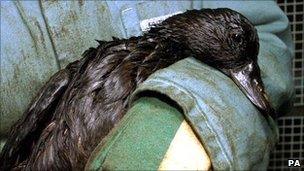Warning over risk to Pembrokeshire from tugboat cuts
- Published
An environmental group has attacked UK government plans to halt four emergency towing vessels in a bid to save £32m.
Friends of the Earth Cymru says ending funding of the tugs, which are used when vessels break down, will put areas like the Pembrokeshire coast at risk.
The group called the cuts a "backward penny-pinching step", claiming they would also endanger seamen's lives.
But the Department for Transport said funding them was not a "correct use of taxpayers' money".
FOE Cymru's views echo those of the maritime union Nautilus, which accused the government of "gambling with lives, the environment and with safety at sea".
The Maritime and Coastguard Agency will stop providing the emergency tugs, known as ETVs, with effect from September 2011.
Gordon James, director of FOE Cymru, said: "The Pembrokeshire coast and marine environment is extremely important for wildlife, fishing and tourism and must be given the best protection.
"The cutting of funding for the large salvage tugs is a backward penny-pinching step that exposes Pembrokeshire's greatest asset to unnecessary risk. It also puts in danger the lives of seamen."
The four ships are based in Falmouth, Dover, the Northern Isles and Western Isles.

A duck coated in oil after the Sea Empress disaster in 1996
The tugs - Anglian Prince, Anglian Princess, Anglian Sovereign and Anglian Monarch - are chartered by the MCA for use in pollution control and towing vessels that are in difficulty.
But the government wants the cost of the salvage and clean-up of boats in distress to be transferred to individual companies and their insurers.
The ETVs were first introduced after the Sea Empress tanker disaster off Pembrokeshire, which spilled 73,000 tonnes of crude oil over 120 miles of coastline in 1996, and the Braer tanker disaster off the coast of Shetland in 1993.
It had been argued that having a powerful tug on hand to tow the Sea Empress into open water would have reduced the environmental impact.
Mr James added: "Although it is proposed that private companies will in future foot the bill for tug cover, there is no guarantee that this will happen.
"We understand that extra tug capacity has been put in place at Milford Haven to deal with the LNG tankers. There is, though, still a need to provide cover for other emergencies and for situations where these tugs would not be available."
- Published24 October 2010
- Published20 October 2010